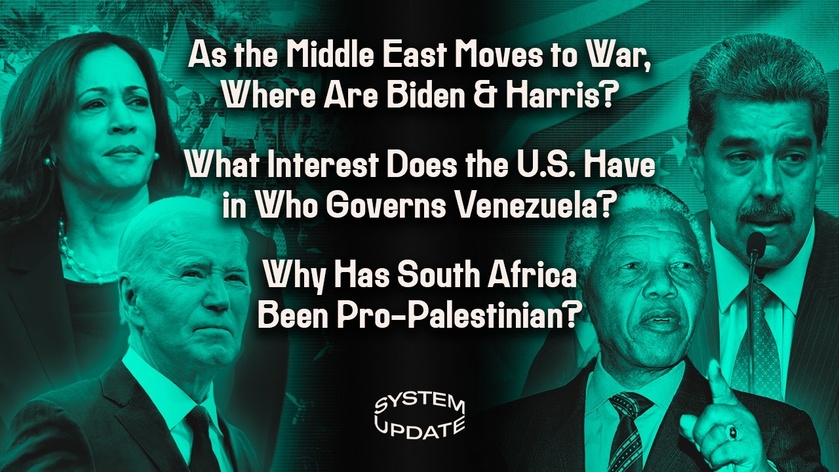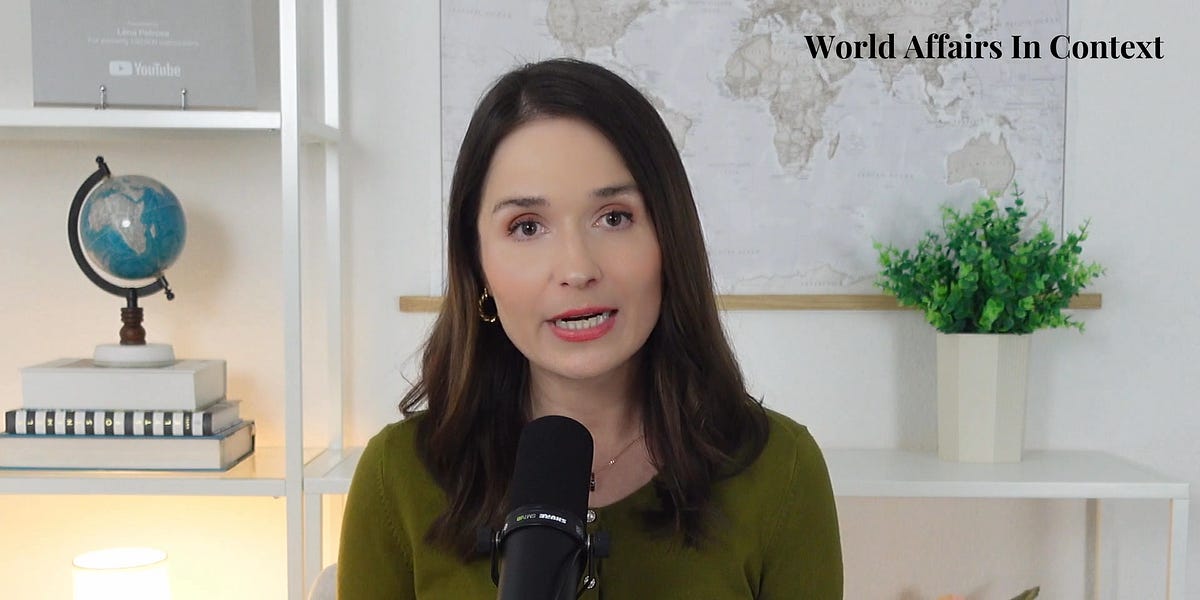Watch the full episode HERE
Good evening. It's Thursday, August 1.
As you can see, tonight is a real episode of System Update, as evidenced by the fact that I am here and Michael Tracey is not. But in all seriousness, I think he did a great job. The audience seemed to really appreciate him, nonetheless, I am glad to be back, and I'm certain that you're as well.
Tonight, it seems as though one says this every other year, or so, but the Middle East is really on the brink of a major escalation. A major regional war from the start of the U.S.-supported Israeli bombing campaign in Gaza back in October, a bombing campaign now in its tenth full month. A major concern has always been that Prime Minister Benjamin Netanyahu actually seeks not only to destroy Gaza, but to use that conflict as a pretext for waging war on all of Israel's enemies in the region, starting with Hezbollah and the Houthis, and then extending, possibly and most disastrously, to Iran itself. We are not that far away from such a dangerous and possibly apocalyptic scenario and whatever else is true, this will not only be an Israeli war but would also be an American war.
Well, we know this in part because all Israeli wars become American wars, at least, at the very least, to the extent that the U.S. will finance and arm the Israeli war, and we'll protect that war diplomatically and could be far more extensively as well. But we also know that this will become an American war, because the current Secretary of Defense, Lloyd Austin, explicitly vowed when asked about the possibility of an escalated regional conflict, “We will help defend Israel, you saw us doing that in April, and you can expect us to do that again,” referring to when the U.S. actually deployed military assets to interrupt and intercept Iranian missiles shot at Israel.
While we have heard that statement, that quite significant commitment from Secretary Austin and others as well, who have waited on this obviously significant national security crisis, two people we have not heard from are the sitting president of the United States, Joe Biden, and the sitting vice president and presumptive Democratic nominee for president, Kamala Harris. That conspicuous omission further fuels two vital questions. First, who is actually running the government of the United States right now, meaning, who makes these crucial foreign policy decisions and who would decide the extent of U.S. involvement in this war if it did escalate further? And second, other than abortion and LGBT rights, which we know very well because we constantly hear that she favors, what does Kamala Harris think about the Middle East and about the U.S. support for Israel? What does she think about pretty much every other significant question that would face an American president somehow, even though she's the vice president of the United States and the Democratic president to be, she has not been asked any of that since Joe Biden stepped down and has really not offered any answers on her own.
Then, Venezuela held national elections over the weekend, and the winner, as declared by government elected officials, was the two-term president, Nicolas Maduro. But in advance of that election, Western officials who oppose Maduro and have long wanted him gone warned that if he won, it would mean that the election outcome is fraudulent. Then, once he was declared the winner over the weekend by officials who were appointed by him and whom he controls, the Western consensus instantly became that there was a fraud, namely that Maduro did not actually win legitimately, but only due to fraudulent manipulation of the election outcome. There is some evidence of that but beyond the question of whether that claim is correct – and we don't actually know for sure, nobody does – the broader and more important question is this: why is the U.S. so interested in the question of who is governing Venezuela? U.S. officials in both parties vehemently denounced Maduro, and many even vowed to do something about it, although it was unspecified what we plan to do. Do we care about Venezuelan elections because, as U.S. officials and their media allies claim, with a straight face, the U.S. simply believes in democracy and freedom and wants everyone in the world to enjoy it? Or are there other reasons worth considering as to what governs and drives U.S. interest, and who governs what is Venezuela?
And then finally, as I have mentioned on social media and I think I mentioned it before I left, the reason I was not here the last ten days – and Michael Tracey was – is that I was traveling with my family throughout South Africa. That country is beautiful and fascinating in so many ways and I highly recommend anyone considering visiting that you should do so. But another aspect of South Africa that I think is worthy of discussion is that ever since the apartheid regime fell and the country became truly democratized, its leaders from across the spectrum, going back to Nelson Mandela and Bishop Desmond Tutu, have been among the most vocal supporters, most vocal and unyielding supporters of the Palestinian cause. Also, some of the most outspoken critics of the Israeli government and it is, of course, still true, given that the South African government, the current one, brought the first case against Israel charging that country with genocide in the International Court of Justice. It's worth examining why. South Africa has taken such a leading role in expressing support for and solidarity with the pro-Palestinian cause. And I'll share some of what I saw and heard to shed light on what really turned out to be a very consequential national ethos in South Africa regarding Palestine and Israel as well.
For now, welcome to a new episode of System Update, starting right now.























